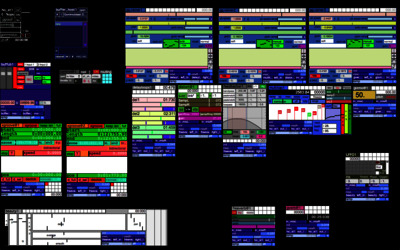“What kind of music do you play?”
Mapp, Christopher (2022) “What kind of music do you play?”. Doctoral thesis, Birmingham City University.
Preview |
Text
Christopher Mapp PhD Thesis published_Final version_Submitted Apr 2022_Final Award Jul 2022.pdf - Accepted Version Download (6MB) |
Preview |
Text
Christopher Mapp Appendix 4 - Transcription of stillefelt post performance discussions.pdf - Accepted Version Download (471kB) |
![Christopher Mapp Appendix 5 - large ppooll screenshot.png [thumbnail of Christopher Mapp Appendix 5 - large ppooll screenshot.png]](https://www.open-access.bcu.ac.uk/14937/3.hassmallThumbnailVersion/Christopher%20Mapp%20Appendix%205%20-%20large%20ppooll%20screenshot.png)  Preview |
Image
Christopher Mapp Appendix 5 - large ppooll screenshot.png - Accepted Version Download (303kB) |
|
Audio
Christopher Mapp Appendix 6 - Solo performance at Fizzle 26th March 2019.wav - Accepted Version Download (343MB) |
|
|
Audio
Christopher Mapp Appendix 7 - Extract from Solo performance at Fizzle 26th March 2019.wav - Accepted Version Download (102MB) |
|
Preview |
Video
Christopher Mapp Appendix 8 - Extract from stillefelt Performance 3 on Friday 25th October 2019.mp4 - Accepted Version Download (848MB) | Preview |
Preview |
Video
Christopher Mapp Appendix 9 - Extract from stillefelt Performance 1 on Wednesday 23rd October 2019.mp4 - Accepted Version Download (487MB) | Preview |
Preview |
Video
Christopher Mapp Appendix 10 - stillefelt - Alone (together).mov - Accepted Version Download (2GB) | Preview |
Abstract
The question “what kind of music do you play?” stems from an ordinary, everyday conversation. It underpins this thesis in a way that highlights the ordinary, everyday aspects of the artistic practice with which it is concerned. In his later work, Wittgenstein advocated for a way of ‘doing philosophy’ that closely examines the details of ordinary, everyday uses of language in context to clarify their meaning. Through his Philosophical Investigations he encourages us to ignore the temptation to be drawn into answering metaphysical questions—a way of doing philosophy which he thought said little about human nature—and instead focus on the specific examples which cause us to feel lost. If we closely examine these moments, if we “look and see” (§66), then we can begin to address a (small) philosophical problem not the (big) philosophical problem. As we solve these small problems by thinking through individual instances in detail, we can then begin to remedy our lostness.
In this thesis I draw on Moi and Diamond’s understanding of Wittgenstein’s spirit of investigation to closely examine the details of my own artistic practice. The confusion caused when I attempt to answer the question “what kind of music do you play?” brings forward examples to think through, from my practice and beyond, as a means of clarifying my response. Weaving these ideas, theories and examples through one another, this thesis explores the inherent narrativity of improvised music practice as well as directly addressing its key narratives; freedom, identity, temporality and the idea that improvisers must be ‘saying something’ through their music-making. his thesis is a philosophy of improvisation, one which seeks to foreground a holistic consideration of artistic practice—a practice that includes the text of this thesis itself—and broadens our understanding of what it means to improvise music together.
| Item Type: | Thesis (Doctoral) |
|---|---|
| Dates: | Date Event April 2022 Submitted July 2022 Accepted |
| Uncontrolled Keywords: | Music, improvisation, Wittgenstein, practice as research, Moi, jazz, ordinary language, narrative |
| Subjects: | CAH25 - design, and creative and performing arts > CAH25-02 - performing arts > CAH25-02-02 - music |
| Divisions: | Doctoral Research College > Doctoral Theses Collection Faculty of Arts, Design and Media > Royal Birmingham Conservatoire |
| Depositing User: | Jaycie Carter |
| Date Deposited: | 14 Nov 2023 11:55 |
| Last Modified: | 14 Nov 2023 11:55 |
| URI: | https://www.open-access.bcu.ac.uk/id/eprint/14937 |
Actions (login required)
 |
View Item |
 Tools
Tools Tools
Tools